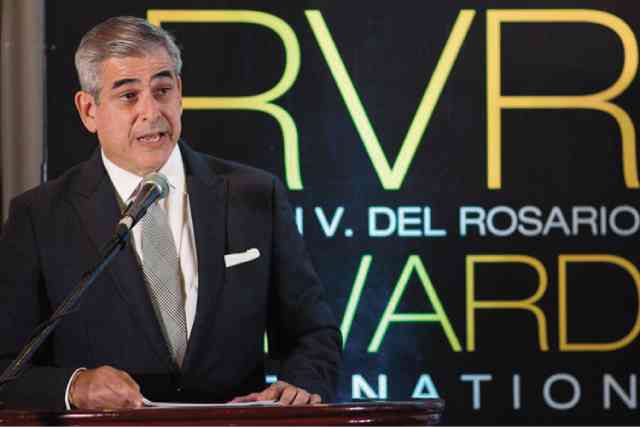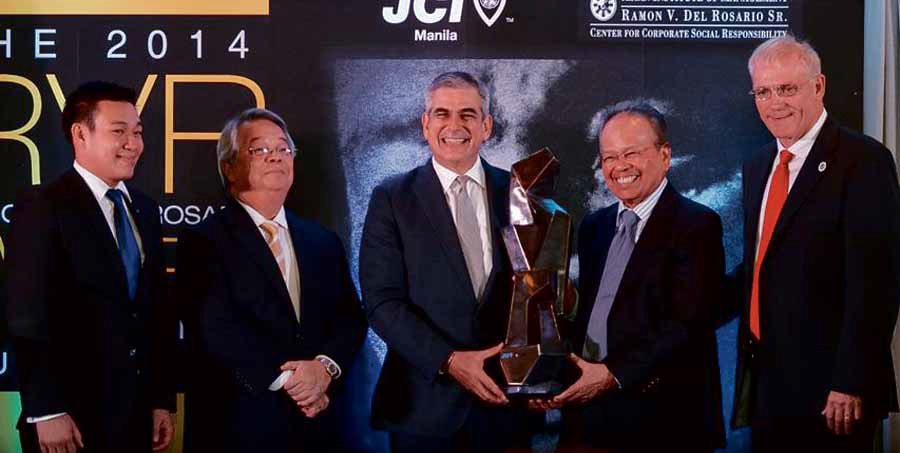Private sector plays key role in nation-building
This year, we [in the Ayala group] celebrate the 180th anniversary of our founding.
We are proud to be part of an institution that has been a participant and contributor to our nation’s economic history over the last two centuries but, more than anything, I believe this award is a recognition of how many of us across the group have been able to participate in a broader playing field, thanks to the legacy and reach of the institution we are a part of; this would include all those who share the institution’s legacy and responsibility with me: our extraordinary executive team, our many distinguished directors from across the group and last, but certainly not the least, Lizzie and my extended family. All I can say is that I feel proud to be part of this great team.
I am also privileged to be sharing our organization’s leadership with my brother, Fernando.
As seventh generation stewards of Ayala, I have always been proud of the fact that Fernando and I share the same values and long term goals.
We share these both at professional and personal levels, while seeking to chart a path for Ayala that creates a fair return for the risk capital we put to work on behalf of shareholders and executing in ways that we hope contribute to the broader goals of a progressive society.
I do not want to dwell too much on our history as a company here tonight, proud as we all are to be part of it, except to say that, in many ways, our longevity has been a result of two important factors; one, an effort on the part of Ayala and its leadership team to re-invent themselves and remain relevant to changing economic and social circumstances; and secondly, by being rooted and guided by a set of values that have kept us anchored and aligned to our country’s economic and social transformation.
Let me briefly touch on these two topics as they remain the foundations that I have sought to reinforce during my leadership tenure—and which I share with all those who I work with—both in executive and in governance roles.
It is these two qualities that have allowed Ayala to remain relevant as an institution over its history and which, hopefully, will keep it relevant in the future.
The first cornerstone, an effort to keep re-inventing ourselves, I like to think, has been key to our long-term success and has kept us on a progressive path of business development.
It has also been a distinct legacy of our past leadership team throughout our history. It has enabled us to survive shifts in the technology, consumer and industrial landscapes.
We have all seen how in many businesses, particularly those with a successful history, it is extremely easy to become complacent.
Organizations can become comfortable and passive and the real challenge, we have learned throughout the years, is to continually find ways, no matter how painful, to re-invent one’s self and to remain relevant to the changing needs of the market around us amid disruptive trends and structural changes in our history.
There are never any easy answers but irrelevancy is always around the corner in this day and age, in whatever field you are in.

WITH Zobel de Ayala (fourth from right) during the awarding are (from left) daughters Eugenia and Mariana, nephew Jaime Urquijo, sister Sofia Elizalde, wife Lizzie, sister-in-law Kit, brother Fernando and sister Patricia.
We have taken risks in this regard and we are lucky that we have had more successes than failures. One can argue about capitalism’s many failures but there is no doubt in my mind that, under the right regulatory and legal framework, it remains a powerful force for innovation in addressing societal needs. However, one can only make a difference if one thrives and survives through its Darwinian cycles of change.
New industries
Our entry into new industries like water distribution and telecommunications, for instance, were borne out of a vision of the potentially disruptive trends in those sectors and in anticipation of the tremendous impact that massive capital expenditures driven by private capital, or wireless communication technology, would have in our everyday lives.
They were not without their risks at the time but the end result was an Ayala that contributed to integral pieces of the infrastructure of a modern economy.
In more recent years, we have had to make difficult decisions to divest certain businesses, while investing in new industries such as power generation, transport infrastructure and education.
These are sectors that traditionally lie outside our comfort zone, but where we see structural shifts and opportunities. We also gained comfort through the trust built by our partnerships (Phinma being a prime example) with like minded parties with similar visions.
My key point is that it is hard to contribute to society, as a business, if you become irrelevant so the first order of the day is to embrace progressive change, careful risk taking and cultivate a long term plan for success.
These business and market driven goals must remain integral to a business if it is to remain successful and, subsequently, contribute to the community around it.
Let me move on to my second point, namely our desire to remain aligned to our country’s economic and social transformation.
This is a personal choice but one that has aligned us, as an institution, to be part of the fabric of civil society rather than remain adjunct to it.
I would also like to say that in this sense, we share common goals and aspirations with all of you in this room today.
All I see in this room are like minded individuals. All of you regularly contribute to society in myriad ways, beyond the required scope of your professional interests, and I remain indebted to you all for all I have continued to learn from you.
Throughout our 180 years, we have sought to remain committed to a value-system built around pioneering change and nation building.
Our desire to remain part of the country’s social and economic agenda has kept us attached to the fate of our country.
It has meant that we have had to align ourselves to and promote the very policies that we also believe are appropriate for everyone around us.
Together with many like minded individuals in this room, we have sought to embody in our institution the very policies of progressive change that we would also like to see in our society.
This value framework of an institution that is committed to nation building, and aligned to progressive development, is something we have sought to promote across our organization; it guides us in our decisions, and it is reflected in many of our actions.
Let me therefore turn to the one issue I wanted to emphasize here tonight: The role of the private sector in nation building.
The private sector has always been a key player in nation-building, arguably even more so in this day and age when the economic framework laid out by our government has given us a window for possible large scale economic transformation. However, I would argue that our role in society must stretch past traditional economic boundaries. This is not always a conventional line of thinking.
Today, we find ourselves with an administration grounded on good governance and transparency, and we operate within a Philippine economy that continues to outperform its peers in relative terms.
Unique environment
While the private sector—with its advantaged access to capital, technology and talent—is benefiting from this unique environment, we also share a greater responsibility to more broadly engage and support the country’s development agenda as the specter of inequality continues to haunt us.
I have always argued that the private sector has to see itself as a provider of solutions, not only to market driven opportunities but also to the needs of society at large.
It has the wherewithal to help create a safer, progressive, more equal, more balanced and more livable society.
The country would benefit if we, all of us in the private sector, worked hard at allocating resources to providing innovative solutions to the key challenges to inclusive growth in our communities, and compliment our local and national governments in these efforts. More on more, the private sector will be looked upon to infuse good management principles, strategic long-term thinking, allocate capital and engage in concerted action to bring all segments of our society to be equal members of the formal economy.
This can revolve around specific products or services that address broader communities or we can be catalysts to make the vital infrastructure needs of our country a reality.
The need for the private sector to step up becomes even more important within the context of Asean integration and the increasing economic integration of the world around us. We need a broader, more collective effort to help make our country more competitive, align ourselves to global standards and integrate ourselves into a broader community of nations.
We, as businesses, need to collaborate and work across sectors to define where we can carve out unique strengths and capabilities that will allow us to thrive in an increasingly interconnected and interdependent world.
Our business environment thrives and is strengthened by competition, but collaboration is key if we are to harness our strengths collectively for our country.
All of this becomes next to impossible without an educated, progressive society that trusts each other, that can work efficiently, live comfortably in safety and peace, and create wealth across all spectrums of our country to keep the cycle of progress alive.
As a sector with an inordinate access to the best resources our country can offer, we have no choice but to share in the responsibility of helping make our country great.
Broader responsibility
Your kind recognition, and this award, are a reminder that this broader responsibility must remain alive in the leadership we all provide to the institutions we are part of.
Looking around this room tonight is also a reminder that so many others have contributed in so many ways to strengthening the fabric of our society through leadership and engagement, be they from the private sector or from the executive, legislative or legal branches of society.
It continues to be a pleasure for me to share these initiatives with so many of you and to continue learning from all your many successes.
Let me once again thank the Del Rosario family, Asian Institute of Management and JCI Philippines for this honor.
Initiatives such as the “RVR Award for Nation Building” inspire enterprises like ours to continue striving to remain relevant and do our share to contribute to progressive economic growth for our nation.
I am deeply honored and humbled to be in your company here tonight and I thank you for this recognition which I will always cherish.
(This article is culled from the speech Zobel de Ayala gave after receiving this year’s Ramon V. del Rosario Sr. Award for Nation Building. The awarding was held on Aug. 18.)
















